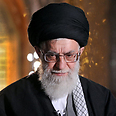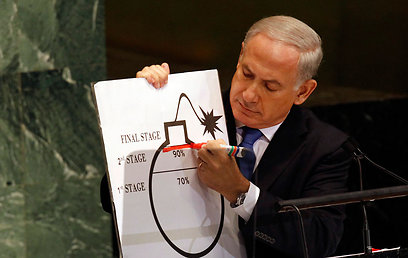
Western officials: Iran to cool nuclear work ahead of elections
US, Israeli, European officials tell Wall Street Journal Khamenei decided to limit nuclear activity in accordance with Israeli demands to avoid international crisis ahead of June election; move represents 'delay, rather than a change of heart,' they warn
Supreme Leader Ayatollah Ali Khamenei has decided to keep Iran's nuclear program within limits demanded by Israel for now, The Wall Street Journal reported Tuesday, citing US, European and Israeli officials.
According to the officials, the move is designed to avoid an international crisis ahead of Iran's presidential elections in June.
Related stories:
- Expert: Israel not in position to attack Iran
- Khamenei calls for more terror attacks on West
- Khamenei: Iran will destroy Tel Aviv if attacked
The officials said Khamenei is eager to place a leader more aligned with his positions than current Iranian President Mahmoud Ahmadinejad, without sparking a repeat of the nationwide unrest that followed a 2009 vote.
The Wall Street Journal said Khamenei's approach is placing the Obama administration and its allies in a "delicate strategic position, possibly constraining their response to Iran's nuclear program." US, European and Israeli officials have described 2013 as the "critical" year in Iran's nuclear program, which has been seen as a reference to the possible use of military force, the newspaper reported.

PM presents 'red line' diagram during UN speech (Archive photo: Reuters)
International negotiations aimed at curbing Iran's nuclear program resume Friday in Kazakhstan and involve the five permanent members of the UN Security Council plus Germany. It will likely be the last round of talks with Tehran until after the June elections, US officials told The Wall Street Journal.
The report said that as part of its efforts to ward off international pressure, Iran has kept its stockpile of uranium enriched to 20% purity below 250 kilograms (550 pounds). Iran would need such an amount—if processed further into weapons-grade fuel—to produce one atomic bomb, experts believe. It is also the amount Prime Minister Benjamin Netanyahu told the United Nations in September that the world should prevent Iran from amassing, through a military strike if necessary.
In January, Netanyahu said that "as of now," Iran has "yet to cross this red line."
The International Atomic Energy Agency said in late December that Tehran had amassed 232 kilograms of uranium enriched to the 20% level, but that almost 100 kilograms of that amount is being converted into fuel plates to power Tehran's research reactor. Fissile material in this form is difficult to use in a weapons program, according to US and European officials.
"Based on the latest IAEA report, Iran appears to be limiting its stockpile of 20% enriched uranium by converting a significant portion of it to oxide," a senior US official working on Iran told The Wall Street Journal. "But that could change at any moment."
According to the newspaper, US and Israeli officials believe Iran's moves represent a "delay, rather than a change of heart," and that other actions are accelerating the pace at which the country could create weapons-grade fuel, such as the installation of thousands of new centrifuge machines at the Fordo underground military facility.
- Receive Ynetnews updates directly to your desktop










